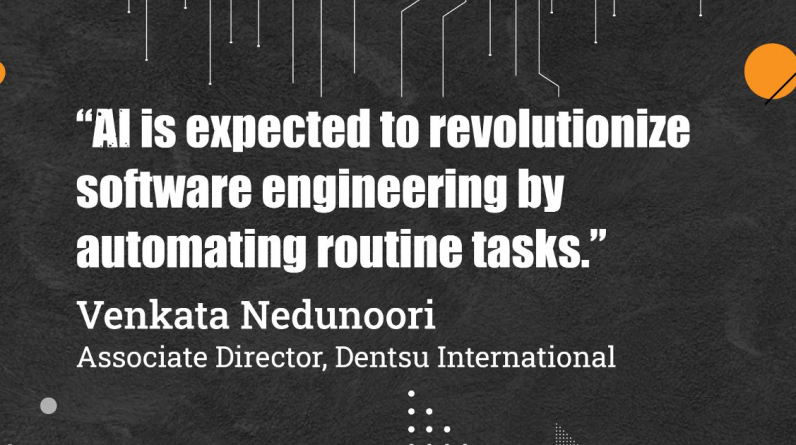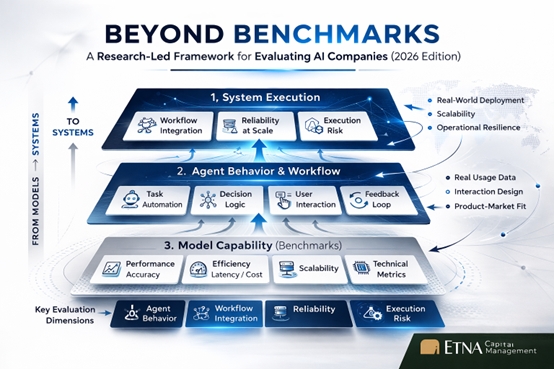
Venkata Nedunoori is a seasoned IT leader with over 16 years of expertise across multiple domains. He is currently an Associate Director at Dentsu International.
His expertise is in software engineering and cybersecurity, particularly AI trends, automation, and cloud security. He expertly navigates the convergence of different technologies, resulting in robust solutions.
INDIAai interviewed Venkata to get his perspective on AI.
Can you describe your journey and how you became involved in AI and machine learning?
My journey into AI and machine learning is not only a professional evolution but also a reflection of my deep-seated interest in exploring emerging technologies to solve complex problems. With over 15 years of experience in software engineering, focusing on developing secure, scalable, and robust cloud-based solutions, my keen interest in AI and machine learning was motivated by my passion for innovation.
As an Associate Director at Dentsu International, my work with cloud technologies and security challenges sparked an interest in AI’s transformative potential in these areas. Driven by a passion for exploring and expanding the horizons of what’s achievable, I delved into the role of AI and machine learning in strengthening cloud security.
As an Associate Director of Software Engineering specializing in cloud security, can you provide examples of how AI technologies protect cloud-based systems and data?
In today’s digital era, protecting cloud-based systems and data is critical to safeguard against evolving cyber threats. Robust security measures are essential to defend sensitive data and maintain trust in cloud technologies. Revolutionizes cloud security by facilitating proactive threat detection and instant response, making data protection more intelligent and adaptive. It equips cloud environments with a dynamic defence against complex cyber threats, ensuring advanced security and resilience.
AI’s role is critical across several fronts: Anomaly Detection, where it pinpoints security anomalies in real-time; Threat Intelligence, adapting defences against evolving cyber threats; Automated Security Protocols, ensuring consistent application of security measures; and Identity and Access Management, analyzing behaviours to secure data access. These applications of AI are pivotal in designing a proactive and robust security strategy for cloud-based systems and data.
How do you ensure the scalability and adaptability of AI-based security solutions to meet the dynamic needs of cloud environments?
It is critical to ensure the scalability and adaptability of AI-based security solutions to effectively handle and address the continuing evolving nature of cloud computing and the unique challenges the cloud environments present. Such dynamic AI solutions require multiple strategies that need to be considered from the design to implementation phases.
Utilizing cloud-native architectures and designing AI security solutions that are inherently scalable, microservices, and containers can aid in easy deployment and scaling across cloud environments. Another crucial strategy is the application of machine learning models to learn and adapt to new threats continuously. Implementing robust data processing pipelines to feed these models with high-quality, relevant data ensures the models can evolve with the threat landscape.
Adopting a multi-cloud strategy can enhance adaptability by designing cloud-agnostic AI security solutions. Lastly, implementing automation and orchestration tools to manage the deployment, scaling, and updating of AI security solutions with minimal human intervention makes the security infrastructure more resilient and responsive to changes.
What are the primary challenges or vulnerabilities in traditional cloud security approaches that AI-driven solutions aim to mitigate?
Traditional cloud security strategies face some challenges that AI-driven solutions are well-suited to address. The primary reason for the challenges is the vast amount of data and the rapidly changing nature of threats. With the traditional approaches, It’s often challenging to keep up with the speed at which new threats emerge and scan through the massive volumes of data quickly enough to identify potential risks effectively.
Another critical issue is scalability. Traditional security solutions must be more dynamic to grow with the business’s needs and expand cloud adoption without sacrificing efficiency or performance. AI-driven security solutions can significantly reduce false alarms associated with differentiating normal activities from genuine threats.
AI-driven security aims to overcome these obstacles by leveraging machine learning to analyze data at scale, identify patterns, and rapidly adapt to new threats, reducing the burden on security teams and enhancing overall security posture.
How do you see the role of AI evolving in the software engineering field in the coming years?
In the next few years, AI is expected to revolutionize the field of software engineering by primarily automating routine tasks. It will allow developers to focus more on complex tasks, practical design and creative work. AI’s ability to analyze vast amounts of data will lead to more predictive and adaptive development processes, enhancing efficiency and reducing errors. The scope for more personalized developer experiences will be expanded through intelligent tools that learn from individual preferences and coding practices. Additionally, AI will improve code quality and facilitate faster development cycles by assisting in code generation, testing, and maintenance, amplifying human capabilities and driving innovation.
How do you stay updated on the latest advancements and trends in AI and machine learning?
Staying updated on the latest in AI and machine learning involves:
- Engaging with online communities.
- Following key industry experts.
- Regularly studying research papers and articles from reputable sources.
Participating in webinars, online courses, and conferences is crucial in keeping abreast of new developments. Besides, practical experimentation with the latest tools and technologies helps solidify understanding and gain firsthand experience. This combination of theoretical knowledge and practical application ensures a well-rounded grasp of the evolving AI and Machine learning landscape. Lastly, joining local or virtual AI interest groups or meetups can help network with peers and experts, offering a platform to share knowledge and learn from other’s experiences.
What are your thoughts on ethical considerations and biases in AI development?
Ethical considerations and biases are paramount in AI development, highlighting the need for careful attention to how AI systems are designed and implemented. The focus is ensuring that AI technologies are developed relatively, transparently, and accountable, avoiding replicating or amplifying societal biases. Diverse and inclusive datasets and varied perspectives in the development team are crucial for minimizing bias. Regular monitoring and revision of AI algorithms are necessary to address emerging biases or ethical issues. Moreover, engaging with broader communities, including ethicists, social scientists, and the public, is essential for understanding the societal impact of AI.
Establishing clear ethical guidelines and standards for AI development and use can guide developers and organizations in creating technology that respects human rights and values. Ultimately, ethical AI development requires a collaborative, multidisciplinary approach to ensure AI technologies benefit society without causing biases.
What advice would you give software engineers or aspiring AI professionals looking to advance their careers in this field?
For software engineers and aspiring AI professionals aiming to advance in AI and ML, a blend of continuous learning and practical experience is vital. Start by building a solid foundation in mathematics and programming, focusing on statistics, probability, linear algebra, and Python. Dive into online courses and tutorials to grasp the basics of machine learning and deep learning. Engage with real-world projects to apply what you’ve learned; open-source contributions can be a great way to gain experience and visibility.
Networking is crucial, so connect with peers and professionals through meetups, conferences, and online forums. Keep up with the latest research by reading papers and following leading AI labs and researchers on social media. Experiment with different tools and technologies to broaden your skill set and understand their practical applications. Persistence and a willingness to tackle complex problems are vital in this rapidly evolving field. Lastly, always be mindful of the ethical implications of your work in AI and strive to contribute positively to society.








